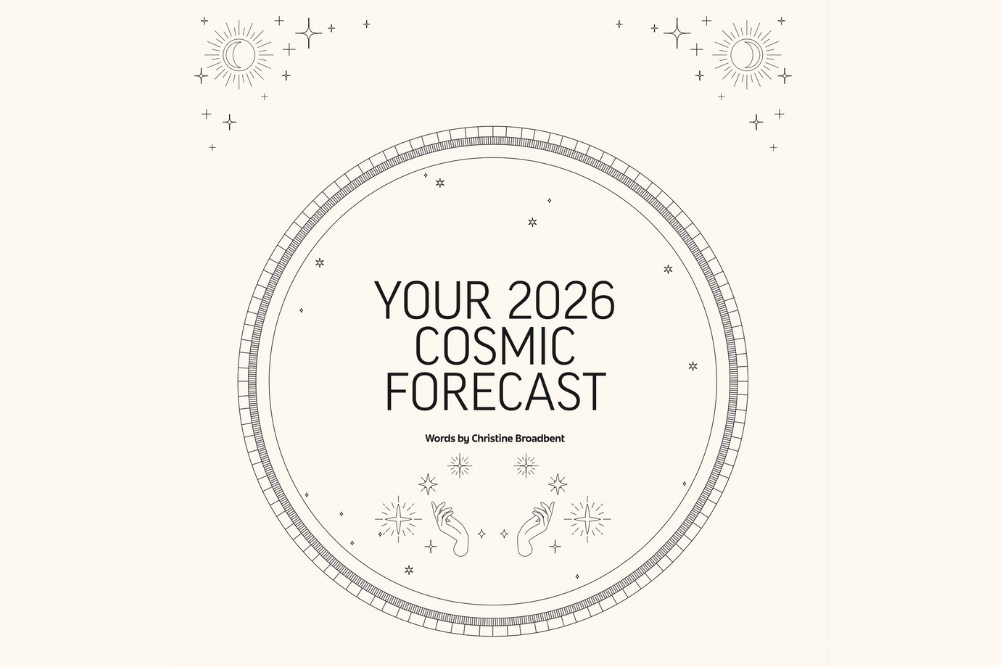How astrology can help you plan your future
Astrologers are known for their ability to use maps of the sky to help you understand yourself and life’s direction. What’s less well-known is their ability to work forwards — that is, to create a chart for a moment in the future, based on the desired outcomes of whatever you are about to begin.
Astrology is based on the ancient philosophical premise that the energy present at the start of a thing — be it person, place or venture — is infused into the undertaking. In other words, whatever is born at a moment in time encapsulates the energy of the moment in which it starts.
From understanding and exploring how the different phases of the Moon are best harnessed for different undertakings, to having an astrologer highlight the best moments for your ventures, astrology can help you make the most of pervading planetary influences.
This biblical passage, from Ecclesiastes 3:1, nicely sums up the inherent understanding astrologers have regarding the nature of time:
“To everything there is a season, and a time to every purpose under the heaven. A time to be born and a time to die, a time to plant and to pluck up that which is planted; a time to kill and a time to heal; a time to break down and a time to build up; a time to weep and a time to laugh; a time to mourn and a time to dance; a time to cast away stones and a time to gather stones together; a time to embrace and a time to refrain from embracing; a time to get and a time to lose; a time to keep and a time to cast away; a time to rend and a time to sew; a time to keep silence and a time to speak; a time to love and a time to hate; a time of war and a time of peace.”
Inherent within the astrological tradition is the concept that some moments in time — as defined by their astrological influences — are vastly better for certain undertakings than others. Under the umbrella of this concept lie beliefs such as planting or farming by the Moon, known to many who practise a biodynamic gardening.
The Moon
The Moon’s cycle is a key feature in determining the rightness of a moment for a particular undertaking. The Moon waxes (grows) and wanes (shrinks) throughout its monthly cycle, offering different levels of growth or contraction energy through the course of its cycle.
To everything there is a season, and a time to every purpose under the heaven.
Your first step to timing your life by astrology is to get a local Moon calendar (so it’s in your time zone). New Moons are classic times for new beginnings, while Full Moons highlight emotions and relationships. The period from the New Moon through the crescent, first quarter and waxing gibbous phases is the growth half of the Moon’s cycle. This is the better half of the Moon’s cycle for starting new initiatives, be they a business or marriage. Gardeners use this half of the cycle for planting, while my sister loves this half of the Moon cycle for visiting the hairdresser for a regular trim (when she wants lots of regrowth).
The period from the Full Moon through the disseminating or waning gibbous, third quarter and balsamic phases is the closing half of the Moon’s cycle. As such, it’s best for tasks designed to bring about endings. In the garden, this half of the cycle is good for harvesting (especially the full or disseminating phases) and for weeding (ie cutting where you want to reduce growth). From a grooming perspective, this half of the Moon cycle inhibits growth and is therefore best for leg or bikini waxing/laser treatments — where the intention is to delay or inhibit growth.
Days and hours
Another simple tool for timing your life by astrology is to call on the planetary rulers for each day or for the hours within each day. The days of the week were named for each planet and each planet’s energy is thought to infuse its day, suggesting different undertakings are better suited to different days of the week.
Sunday — Sun
Monday — Moon
Tuesday — Mars
Wednesday — Mercury
Thursday — Jupiter
Friday — Venus
Saturday — Saturn
Planetary hours are slightly different from regular “clock” hours. The total amount of daylight or night time on a given day is divided by 12 to create an individual hour for that time of year. For instance, in Sydney in the summer time, sunrise can be as early as 5.40am, with sunset as late as 8.05pm. This gives a total of 14 hours and 25 minutes of daylight (865 minutes). Dividing this by 12 gives the length of a planetary hour in the height of summer as approximately 72 minutes. Therefore, each planetary hour in summer is about one hour and 12 minutes of clock time. (Contrast this with the just over 10 hours of daylight in Sydney in the winter, which gives a planetary hour of around 50 minutes clock time.)
The planetary hours cycle through the Chaldean order of planets, which flows thus:
Saturn
Jupiter
Mars
Sun
Venus
Mercury
Moon
The first hour of a day is ruled by the planet whose day it is. On Friday, Venus’s day, Venus rules the planetary hour, with the planets then cycling through the above list progressively — Mercury to the Moon to Saturn and onwards. On Saturday, Saturn’s day, Saturn rules the first house, Jupiter the second and so on.
Thanks to technology, you don’t need to think much more about how planetary hours work than that — there’s a variety of free programs that provide this information. I suggest Chronos XP, which you can download at http://chronosxp.sourceforge.net/en/
Here’s a quick guide as to what each planet’s day or hour is associated with:
- Saturn — organisation, responsibility, doing what needs to be done
- Jupiter — success for priority plans in all areas, tendency to excess
- Mars — physical activity, assertive, courageous, action, decisiveness, confrontation
- Sun — professional success, work endeavours, promotion, being seen
- Venus — love and romance, attraction, socialising, Beauty and appearance, peace and harmony
- Mercury — thinking, communicating, documents, contracts, gadgets and technology
- Moon — domestic matters, issues where change or flux is desired or normal
You can combine the energy of the day with the energy of the hour to blend influences; for example, a Mars day/Saturn hour or Saturn day/Mars hour combination might be good for tackling tasks that must be done but require physical exertion. Or pick a time when the planet linked to your intentions is doubly strong — the Venus hours on Venus’s day have double emphasis on socialising and romance, for example.
Planet cycles
Another step towards timing your life by astrology is to explore some of the current planet influences and how they may be affecting your life, via activation in your personal birth chart. While each person is unique — and everyone has different potential based on the planetary arrangements active at birth — there are some general guidelines you can use to time your life by the stars.
Jupiter*
While there is no “perfect” moment for anything, by watching and observing the planet’s rotations, astrologers determine moments that have supportive qualities for different endeavours.
Jupiter’s cycles are about growth and expansion. Under the influence of Jupiter, desires for travel and study often emerge. Anything begun under a Jupiter influence is likely to grow quickly into something abundant. Jupiter’s cycles are active just before birthdays that are multiples of 12. So if you or someone you know is about to turn 12, 24, 36, 48, 60 or 72, Jupiter’s influence is active. This provides general support for expansion and growth plans in all areas of life, but especially for travel or study endeavours.
Currently, Jupiter is energising the sign of Taurus (July 2011 to June 2012), making it a personally rich time for growth, expansion and generally getting out of one’s comfort zone for the fixed signs — Taurus, Leo, Scorpio and Aquarius. As of June 2012, Jupiter enters Gemini, where it stays until mid-2013. This transition transfers the bounty and growth focus of Jupiter to the mutable signs Gemini, Virgo, Sagittarius and Pisces.
Saturn
Saturn’s cycles are about contraction, consolidation and restructuring. Under the influence of Saturn, issues around time management, commitment and responsibility are likely to surface. Anything begun under a Saturn influence is likely to require effort but be long-lasting.
Saturn’s cycles are active at seven-year intervals, so anyone turning an age that is a multiple of seven — 21, 28, 35, 42, 49 and so on — is experiencing the influence of Saturn. This provides general support for consolidation and getting back to basics in all areas of life, but most especially regarding career and relationship goals.
Currently, Saturn is in the sign of Libra (October 2009 to October 2012), making it a personally rich time for grounding, consolidating and reprioritising for the cardinal signs of Aries, Cancer, Libra and Capricorn. As of October 2012, Saturn will enter Scorpio, a fixed sign, transferring the energy of maturing, responsibilities and commitment to the fixed group of signs — Taurus, Leo, Scorpio and Aquarius.
Your astrologer would also consider influences from the three modern or outer planets, Uranus, Neptune and Pluto. As Uranus is about change and independence, if you were experiencing a personal Uranus cycle, this would not be the ideal time to start a long-term venture such as a business or a marriage. Neptune is about creativity and spirituality and his cycles are ideal for reducing responsibilities and taking extra time out. Pluto’s themes link to power, control and the death/rebirth cycle, showing his cycles to be fabulous for reincarnation, such as going through a radical health overhaul or weight-loss program.
Electing a chart
Electional astrology is the branch of astrology whereby your astrologer “elects” — or creates — a chart for a future moment in time, based on your objectives. This is commonly done for couples looking for an auspicious time to marry or an entrepreneur looking for an optimal time to start a new business venture.
To create a specific chart — which involves selecting not just an optimal day for your goals but the minute within that day that’s most congruent with your intentions — your astrologer first explores via symbolism in your birth chart the energies to which you are most attuned.
You may be a Gemini (mutable air) but your career sign may be Scorpio (fixed water). If your intention is to launch a new business, creating a chart that activates the Scorpio/career influences within your birth chart is most important.
While there is no “perfect” moment for anything, by watching and observing the planet’s rotations, astrologers determine moments that have supportive qualities for different endeavours. The moment ideal for starting a business may necessitate a focus on Saturn, while a “birth” time for a marriage generally invites a focus on Venus.
Astrologer John Frawley, writing in The Real Astrology, notes, “Electional astrology will not work miracles: no chart will make a success of a marriage between two fundamentally incompatible people, or of a business selling icecream at the North Pole. But if there is potential there, a well-timed electional chart will bring out its best qualities and smooth over the faults.”
A couple I recently worked with had strong mutual links to the part of the Zodiac that fell between 22 and 28 Libra. Her Venus is at 25 Libra, her Jupiter at 22 Libra. His Moon and Jupiter were conjunct at 28 Libra. When two people both have planets at close to the same degree in the Zodiac, these planets represent a key part of the planetary influences underlying their relationship. As such, if looking to elect a chart for their marriage, you’d pick a date where the common part of the Zodiac was activated positively. In Libra, Venus and Saturn are the most positive planets, so ideally their wedding chart would include either Venus or Saturn between 22 and 28 Libra, in essence energising and strengthening the already existing astro bond they share.
Exploring these essential rhythms of life reveals how you can time your life to different cosmic energies, based on your varying intentions. This helps you work with rather than against the energy of the moment, ensuring your best efforts not only are well intentioned but ultimately lead to more happiness.
*These Jupiter and Saturn cycles refer to general trends affecting you by star or Sun sign placement only. You may have other planets — the Moon or Venus, for example — in different signs from your Sun sign, showing you’ll be accessing Jupiter or Saturn that way! Check out your chart free at www.astro.com to find out more.
References
- The Real Astrology by John Frawley
- www.llewellyn.com/journal/article/534
*Information correct as of mid 2012








